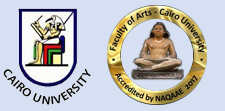عنوان المقال عربي
The significance of Orpheus’s Myth in Sarah Ruhl’s Eurydice: An Intertextual Approach
Document Type
Original Study
كلمات مفتاحية عربي
intertextuality, myths, father/daughter relationship
Abstract English
This paper compares the contemporary myth of Eurydice by Sarah Ruhl with the Greek mythology of Orpheus, drawing on Julia Kristeva’s theory of intertextuality and Carl G. Jung’s concepts about myth. According to Julia Kristeva, the term “intertextuality” refers to interpreting the meanings of literary texts in the light of other texts. This paper reveals the comparabilities between Eurydice and the Greek mythology “Orpheus.” Both stories share some features like aspects of character and ways of narrating while it differs with regard to the plot and images. The main focus of this study is to shed light on parallels, additions and their functions. The playwright uses the Greek myth to represent modern hero myth in a male dominated culture. It deals with love, loss, death and reminiscence. The play deals with incompatible notions such as forgetfulness, memory, happiness, grief, the real world, the underworld, despair, hope, uncertainty and faith. The study shows that the playwright uses a classical myth about two lovers to put into focus father/daughter relationship. This asserts that some old myths are timeless, and each generation is capable of reinventing and reproducing them. Moreover, modern generation can create its modern hero myth to ennoble its heroes and idealize their experiences.
الملخص العربي
This paper compares the contemporary myth of Eurydice by Sarah Ruhl with the Greek mythology of Orpheus, drawing on Julia Kristeva’s theory of intertextuality and Carl G. Jung’s concepts about myth. According to Julia Kristeva, the term “intertextuality” refers to interpreting the meanings of literary texts in the light of other texts. This paper reveals the comparabilities between Eurydice and the Greek mythology “Orpheus.” Both stories share some features like aspects of character and ways of narrating while it differs with regard to the plot and images. The main focus of this study is to shed light on parallels, additions and their functions. The playwright uses the Greek myth to represent modern hero myth in a male dominated culture. It deals with love, loss, death and reminiscence. The play deals with incompatible notions such as forgetfulness, memory, happiness, grief, the real world, the underworld, despair, hope, uncertainty and faith. The study shows that the playwright uses a classical myth about two lovers to put into focus father/daughter relationship. This asserts that some old myths are timeless, and each generation is capable of reinventing and reproducing them. Moreover, modern generation can create its modern hero myth to ennoble its heroes and idealize their experiences.
Recommended Citation
Misbah, Randa
(2021)
"The significance of Orpheus’s Myth in Sarah Ruhl’s Eurydice: An Intertextual Approach,"
Journal of the Faculty of Arts (JFA): Vol. 81:
Iss.
2, Article 18.
DOI: https://doi.org/10.21608/jarts.2021.62091.1071
Digital Object Identifier (DOI)
10.21608/jarts.2021.62091.1071
Accept Date
2021-06-15
Publication Date
4-1-2021

